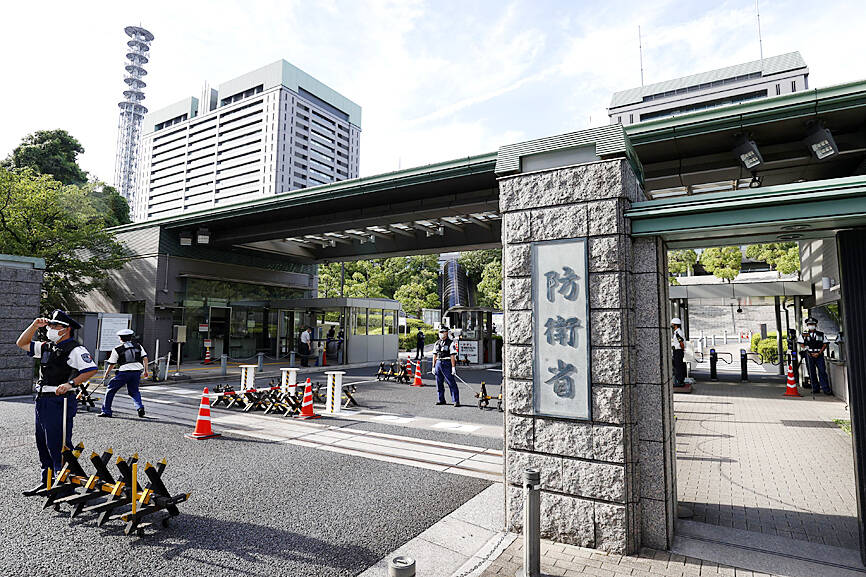Japanese authorities are to deploy missiles with a range of up to 1,000km on the island of Kyushu before the end of this year, Japanese media reported yesterday.
The medium-range missile systems would be capable of striking enemy vessels in the Taiwan Strait, and bases in China and North Korea, enhancing Japan’s defense capabilities and serving to protect Taiwan from a potential Chinese military attack, Kyodo News reported.
Deployment of the land-based anti-ship missile systems would begin by the end of this year, Kyodo News said, citing anonymous sources.

Photo: AP
Multiple government sources said that the missiles would be an upgraded version of Mitsubishi’s Type 12 surface-to-ship missile, Kyodo News reported.
The Japan Ground Self-Defense Force already has land-based anti-ship missile units on Kyushu, and potential deployment sites for the new missiles include Yufu in the island’s Oita Prefecture, and a garrison in Kumamoto City, it said.
However, as the missile sites could become potential targets for attacks, opposition from residents are expected, it said.
To address such concerns, the government would hold briefing sessions to gain local support, it added.
Although Okinawa is geographically closer to China, the Japanese government is wary of deploying new missiles there, as doing so could further escalate regional tensions, the report said.
As a result, Okinawa would not be included in the initial phase of the missiles’ deployment, it said.
The decision to deploy the new missiles is being seen by some military analysts as a shift in Japan’s defense strategy toward a more offensive-oriented “counterstrike capability,” it said.
Japanese authorities hope the deployment could serve as a deterrent to threats from North Korea, as well as a “check on China’s military actions in the Taiwan Strait,” the report said.

DEFENSE: The National Security Bureau promised to expand communication and intelligence cooperation with global partners and enhance its strategic analytical skills China has not only increased military exercises and “gray zone” tactics against Taiwan this year, but also continues to recruit military personnel for espionage, the National Security Bureau (NSB) said yesterday in a report to the Legislative Yuan. The bureau submitted the report ahead of NSB Director-General Tsai Ming-yen’s (蔡明彥) appearance before the Foreign and National Defense Committee today. Last year, the Chinese People’s Liberation Army (PLA) conducted “Joint Sword-2024A and B” military exercises targeting Taiwan and carried out 40 combat readiness patrols, the bureau said. In addition, Chinese military aircraft entered Taiwan’s airspace 3,070 times last year, up about

A magnitude 4.3 earthquake struck eastern Taiwan's Hualien County at 8:31am today, according to the Central Weather Administration (CWA). The epicenter of the temblor was located in Hualien County, about 70.3 kilometers south southwest of Hualien County Hall, at a depth of 23.2km, according to the administration. There were no immediate reports of damage resulting from the quake. The earthquake's intensity, which gauges the actual effect of a temblor, was highest in Taitung County, where it measured 3 on Taiwan's 7-tier intensity scale. The quake also measured an intensity of 2 in Hualien and Nantou counties, the CWA said.

The Overseas Community Affairs Council (OCAC) yesterday announced a fundraising campaign to support survivors of the magnitude 7.7 earthquake that struck Myanmar on March 28, with two prayer events scheduled in Taipei and Taichung later this week. “While initial rescue operations have concluded [in Myanmar], many survivors are now facing increasingly difficult living conditions,” OCAC Minister Hsu Chia-ching (徐佳青) told a news conference in Taipei. The fundraising campaign, which runs through May 31, is focused on supporting the reconstruction of damaged overseas compatriot schools, assisting students from Myanmar in Taiwan, and providing essential items, such as drinking water, food and medical supplies,

New Party Deputy Secretary-General You Chih-pin (游智彬) this morning went to the National Immigration Agency (NIA) to “turn himself in” after being notified that he had failed to provide proof of having renounced his Chinese household registration. He was one of more than 10,000 naturalized Taiwanese citizens from China who were informed by the NIA that their Taiwanese citizenship might be revoked if they fail to provide the proof in three months, people familiar with the matter said. You said he has proof that he had renounced his Chinese household registration and demanded the NIA provide proof that he still had Chinese